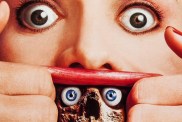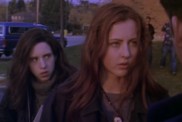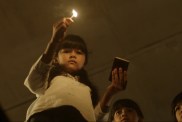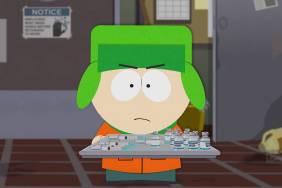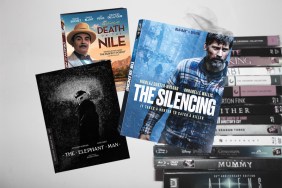
I don’t remember the first time I watched François Truffaut‘s Jules and Jim, but I remember appreciating it though not loving it. Watching it again on Criterion’s new Blu-ray release (buy it here) I feel a greater level of respect, but the film almost feels clinical to me more than anything else. As Truffaut tells the story of a love triangle between Jules (Oskar Werner), Jim (Henri Serre) and the free-spirited Catherine (Jeanne Moreau) I couldn’t help but feel that each scene is a masterclass in filmmaking, though almost to a fault.
Frequently cited as one of the best films ever made, and I assume many would argue Truffaut’s best film, though I’m sure admirers of The 400 Blows would beg to differ, Jules and Jim is an adaptation of Henri-Pierre Roché‘s novel, which Truffaut clearly adored as evidenced by the multitude of interview segments included on this disc. At one point he’s asked whether one should read the book or see the movie first. He simply says, “Read the book,” it’s the interviewer that must add, “I recommend you see the movie as well.”
Dominated by narration, Truffaut gives the film few opportunities to breathe on its own, frequently injecting descriptors you’d expect from a book, descriptors often seen in movies, rather than told. Curiously enough, the narration reminds me of what Woody Allen did with Vicky Cristina Barcelona and You Will Meet a Tall Dark Stranger, though Allen’s narrator was far less explicative whereas I feel Truffaut wants to ensure not a single frame is misinterpreted.
Watching it a second time I only remembered the subtleties of the performances from my first go ’round, glances shared by Jules and Jim as Catherine played with their hearts and minds, a queen to them and a role she owned with plenty of manipulation and cold logic. This time the performances still pop, Moreau specifically I love in this film as she smiles, pouts and dotes affection to get her way, a performance that’s almost the polar opposite to her dour turn in Michelangelo Antonioni‘s La Notte.
Jules and Jim is considered a dramatic romance, and it is for sure, but I view it almost as a fairy tale existing one layer above the real world with some dark realities as it takes place before, during and after World War I The fact Jim is Austrian and Jules is French is used to great narrative favor. Utilizing newsreel footage, Truffaut presents scenes from the battlefield as something of a commentary on the futility of war. Jules writes letters home to Catherine, hoping he isn’t firing on Jim as the two best friends have lost touch since being called up by their respective countries. Once home, they joke of Germany’s defeat, happy to be back together, both alive and well, though certainly changed.
Above all, however, the one aspect of the film that really stands out for me is the cinematography of Raoul Coutard. Whether the camera is craning from one floor to the next, tracking the action in Jules and Catherine’s cottage, running alongside the trio as they race down a bridge, or capturing a wide image of the three friends as the skip pebbles across a lake with a layer of fog hanging overhead, the images and camerawork are astounding, telling every much a story as the narrative itself.
Included on Criterion’s Blu-ray are a wealth of features, almost too many to mention beginning with two audio commentaries. The first features co-screenwriter Jean Gruault, script supervisor Suzanne Schiffman, editor Claudine BoucheÌ and film scholar Annette Insdorf, the other featuring Moreau and Truffaut biographer Serge Toubiana.
[amz asin=”B00GPPXOTS” size=”small”]Next is a nearly 40-minute excerpt from the documentary The Key to “Jules and Jim”, which is dedicated to RocheÌ and the real-life relationships that inspired the novel and film. Next are two interviews, one with Gruault and the other with Coutard, both were conducted for Rainer Gansera’s documentary Working with Truffaut, but the full interviews were not included in that film. Criterion got their hands on the original footage and present them here in their entirety, 40 minutes in total.
Then there are four excerpts from television appearances featuring Truffaut, Moreau, filmmaker Jean Renoir, New York Film Festival director Richard Roud from 1977 and a 1979 American Film Institute seminar given by Truffaut as well as an audio interview with Truffaut from 1980.
Finally, there’s a back-and-forth conversation between film scholars Robert Stam and Dudley Andrew that runs just shy of 24 minutes. I personally found their conversation both enlightening and a little self-important, but interesting nonetheless.
Last but not least, there is a 32-page booklet featuring an essay by critic John Powers titled “On Jules and Jim, a 1981 piece by Truffaut on Roché and script notes from Truffaut to Gruault. Altogether it’s a massive package any fan is sure to appreciate and one that truly takes a close look at Truffaut and his working habits.
As far as a recommendation goes, I don’t personally love this film, though I love the filmmaking on display. For anyone that does love Jules and Jim purchasing this package is a no-brainer. Criterion has left no stone unturned and as much as I don’t think I’ll return to watch this film often, it’s a movie I’m very happy to have seen and now own both on DVD and Blu-ray. I’m not sure if that will help you make your decision on whether or not to buy it, but at the very least I hope it will get you to to watch it.
